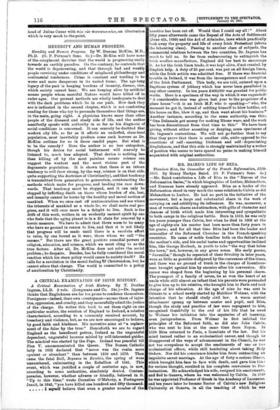A CRITICAL EXAMINA l'ION OF IRISH HISTORY.
A Critical Examination of Irish History. By T. Dunbar Ingram, LL.D. 2 vols. (Longmans and Co. 24s.)—Dr. Ingram thinks that Englishmen are far too prone to condemn themselves. Foreigners—indeed, their own countrymen—accuse them of injus- tice, oppression, and cruelty, and they mournfully admit the justice of the charge. He writes this hook to set them right on one particular matter, the relation of England to Ireland, a relation characterised, according to a commonly received account, by treachery and violence, but, as we are now encouraged to believe, by good faith and kindness. His narrative aims at "a replace- ment of the false by the true." Henceforth we are to regard England as the beneficent patron, Ireland as the ungrateful dependent, ungrateful because misled by sell-interested guides. The mischief was started by the Pope. Ireland VMS peaceful till Pius V. excommunicated the Queen. The Roman Catholic laity in 1602 declared that "never was the realm more opulent or abundant" than between 1558 and 1570. Then came the fatal Bull, Regnans in Excelsis, the spring of woes unnumbered, culminating in the Rebellion of 1641. This event, which was justified a couple of centuries ago, is now, according to some authorities, absolutely denied. Contem- poraries, however, whether adverse or friendly, believed in it. "Up to this time," wrote Cornelius O'lllahony, a Portuguese Jesuit, in 1645, "you have killed one hundred and fifty thousand.
I myself believe that even a greater number of the heretics has been cut off. Would that I could say all !" About fifty years afterwards came the Repeal of the Acts of Settlement (June 4th, 1689) and the Act of Attainder, laws which practically took away the property and life of every Irish Protestant (above the labouring class). Passing to another class of subjects, the commercial relations between the two countries, Dr. Ingram has much to tell us. So far from endeavouring to extinguish the Irish woollen manufacture, England did her best to encourage it. As for the Irish linen trade, it was kept alive, if not created, by English help. A duty of 25 per cent. was put on all foreign linen, while the Irish article was admitted free. If there was financial trouble in Ireland, it was from the incompetence and corruption of the Irish Parliament. This body, we are told, entered upon a flagitious system of jobbery which has never been paralleled in any other country. In ten years £4,00,000 was granted for public works. Here is a specimen of the way in which it was expended: "A considerable sum was given last year to the proprietor of a glass house "—it is an Irish M.P. who is speaking—" who, the moment he got it, instead of settling himself to blow bottles, set his house on fire, blew it up, and then went about his business." Another instance, according to the same authority, was this : "One Delamain got money for making Rhone ware, and the work has been discontinued from that time to this." We have been giving, without either assenting or denying, some specimens of Dr. Ingram's contentions. We will not go further than to say that they prove that there is another side, quite opposed to the assertions of self-asserting Irishmen and self - depreciating Englishmen, and that this side is strongly maintained by a writer of position who seems to have spared no pains in making himself acquainted with original authorities.


















































 Previous page
Previous page